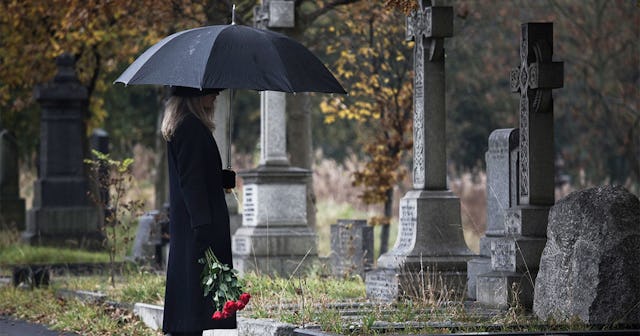Year Four Is For The Guilt

I joined the club that no one wants to join on February 3, 2018, when my husband passed away. I became a young widow and a solo parent and a person intimately acquainted with loss in way I never could have imagined. In the years since, I’ve learned about grief, its curves and edges, the way it shifts and warps over time, bringing a new angle every year.
That first year of widowhood was, unsurprisingly, devoted to the firsts. First anniversaries without my husband, first birthdays without my children’s father, first Father’s day, first Thanksgiving, first everything. Every day was a first. Every day was swarmed by memories of where I was at exactly that time last year. Every day was spent trying and failing to ground myself in this new nightmare reality wherein my husband had died too young, too tragically.
Then came year two, which came with the sucker punch realization that there’s no prize for finishing year one. Year two was for understanding that all those awful firsts are followed by seconds and worse, by ever afters. Year two was for coming to terms with the new reality, for settling into the truth that loss is permanent; there is no going backward.
Year three was for finding footing, and finally looking up. Year three was for taking a breath and realizing that despite the grief and heartache of year one and year two, you’re standing. You’re surviving. In year three, the ground beneath your feet is beginning to solidify. Sure, it’s not quite solid — I’m not far enough along on my journey to know whether it’ll ever feel entirely solid after loss — but it’s not as precarious as it was. And, even if the ground isn’t quite solid, you can stand because you learn you are solid, more than you ever were before. Year three was finally lifting your gaze from the floor because you trust that you can hold yourself up.
This year, this pandemic year, I’m beginning year four as a widow. And year four, I can already tell, will be for the guilt. The guilt of a new relationship, of new happy memories with the kids that sometimes aren’t followed by the words “I wish Daddy was here, too,” the guilt that comes with being okay most days, and not feeling overwhelmed by memories of days that once were too heavy to carry. The guilt of not just standing, but taking those first steps forward.
As the days on the calendar inched closer to February 3, the past was overlaid on the present in my mind. My husband’s final days played on loop in the quietest moments: the phone call with the doctor on the 23rd, telling me there was no hope left; the MRI results on the 24th, showing that his spine was impossibly riddled with disease; telling our children that their dad is dying on the 25th; watching him arrive at hospice, unconscious on the stretcher on the 26th, sitting alone with him as he took his final breath on the 3rd.
But the memories are not bringing me to my knees this year. They are there, perfectly preserved, but the sharpest edges have dulled. The memories make my eyes burn with tears, but they don’t have the force they held other years. I don’t feel crushed by the weight of the past this year. The past is heavy, but not heavy enough to overwhelm me all day.
Intellectually, I know my husband would want us (me and our children) to live and thrive. Intellectually I know if he had a choice in the matter, he’d be telling me to stand taller, nudging me forward a little faster, because his family’s happiness was always his priority. But grief, I’ve learned, isn’t always about what we know intellectually. It’s about what we feel. And what I feel is simply guilt.
Guilt. Because if the memories aren’t bringing me to my knees, what do I have left? The wisp of a memory and little more? Grief that’s not all-consuming? That’s simply not enough.
I never imagined when I started my grief journey that when the darkest days of grief faded, I would feel another loss. I didn’t know that leaving those darkest days of grief behind would feel like losing another piece of him — maybe the last piece. And therein lies the heart of the guilt: it feels as if I’m leaving him behind by leaving behind the darkest parts of grief.
But the truth I’m reminding myself as the guilt becomes overwhelming is that moving forward doesn’t mean leaving him behind. Moving forward is not moving on, or moving away. Moving forward and building a life in which the kids and I are surviving and thriving is a bigger honor to his memory and his legacy than tears could ever be.
And yes, maybe, year four is for the guilt, but maybe year four is also for the love — the love that exists regardless of how the grief looks any particular day.